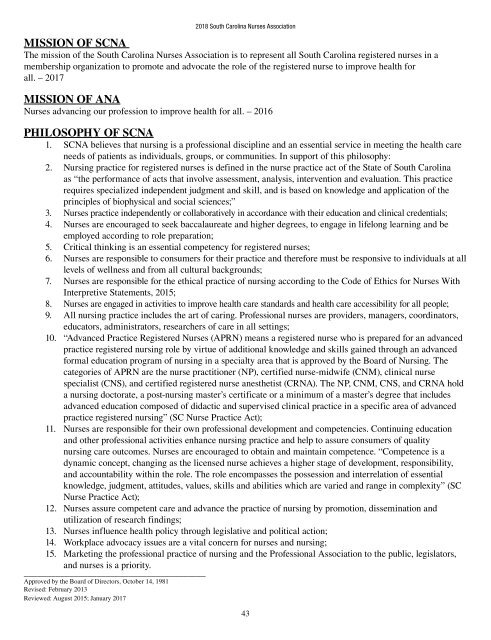2018 South Carolina Nurses Association State Convention
Create successful ePaper yourself
Turn your PDF publications into a flip-book with our unique Google optimized e-Paper software.
<strong>2018</strong> <strong>South</strong> <strong>Carolina</strong> <strong>Nurses</strong> <strong>Association</strong><br />
MISSION OF SCNA<br />
The mission of the <strong>South</strong> <strong>Carolina</strong> <strong>Nurses</strong> <strong>Association</strong> is to represent all <strong>South</strong> <strong>Carolina</strong> registered nurses in a<br />
membership organization to promote and advocate the role of the registered nurse to improve health for<br />
all. – 2017<br />
MISSION OF ANA<br />
<strong>Nurses</strong> advancing our profession to improve health for all. – 2016<br />
PHILOSOPHY OF SCNA<br />
1. SCNA believes that nursing is a professional discipline and an essential service in meeting the health care<br />
needs of patients as individuals, groups, or communities. In support of this philosophy:<br />
2. Nursing practice for registered nurses is defined in the nurse practice act of the <strong>State</strong> of <strong>South</strong> <strong>Carolina</strong><br />
as “the performance of acts that involve assessment, analysis, intervention and evaluation. This practice<br />
requires specialized independent judgment and skill, and is based on knowledge and application of the<br />
principles of biophysical and social sciences;”<br />
3. <strong>Nurses</strong> practice independently or collaboratively in accordance with their education and clinical credentials;<br />
4. <strong>Nurses</strong> are encouraged to seek baccalaureate and higher degrees, to engage in lifelong learning and be<br />
employed according to role preparation;<br />
5. Critical thinking is an essential competency for registered nurses;<br />
6. <strong>Nurses</strong> are responsible to consumers for their practice and therefore must be responsive to individuals at all<br />
levels of wellness and from all cultural backgrounds;<br />
7. <strong>Nurses</strong> are responsible for the ethical practice of nursing according to the Code of Ethics for <strong>Nurses</strong> With<br />
Interpretive <strong>State</strong>ments, 2015;<br />
8. <strong>Nurses</strong> are engaged in activities to improve health care standards and health care accessibility for all people;<br />
9. All nursing practice includes the art of caring. Professional nurses are providers, managers, coordinators,<br />
educators, administrators, researchers of care in all settings;<br />
10. “Advanced Practice Registered <strong>Nurses</strong> (APRN) means a registered nurse who is prepared for an advanced<br />
practice registered nursing role by virtue of additional knowledge and skills gained through an advanced<br />
formal education program of nursing in a specialty area that is approved by the Board of Nursing. The<br />
categories of APRN are the nurse practitioner (NP), certified nurse-midwife (CNM), clinical nurse<br />
specialist (CNS), and certified registered nurse anesthetist (CRNA). The NP, CNM, CNS, and CRNA hold<br />
a nursing doctorate, a post-nursing master’s certificate or a minimum of a master’s degree that includes<br />
advanced education composed of didactic and supervised clinical practice in a specific area of advanced<br />
practice registered nursing” (SC Nurse Practice Act);<br />
11. <strong>Nurses</strong> are responsible for their own professional development and competencies. Continuing education<br />
and other professional activities enhance nursing practice and help to assure consumers of quality<br />
nursing care outcomes. <strong>Nurses</strong> are encouraged to obtain and maintain competence. “Competence is a<br />
dynamic concept, changing as the licensed nurse achieves a higher stage of development, responsibility,<br />
and accountability within the role. The role encompasses the possession and interrelation of essential<br />
knowledge, judgment, attitudes, values, skills and abilities which are varied and range in complexity” (SC<br />
Nurse Practice Act);<br />
12. <strong>Nurses</strong> assure competent care and advance the practice of nursing by promotion, dissemination and<br />
utilization of research findings;<br />
13. <strong>Nurses</strong> influence health policy through legislative and political action;<br />
14. Workplace advocacy issues are a vital concern for nurses and nursing;<br />
15. Marketing the professional practice of nursing and the Professional <strong>Association</strong> to the public, legislators,<br />
and nurses is a priority.<br />
________________________________________<br />
Approved by the Board of Directors, October 14, 1981<br />
Revised: February 2013<br />
Reviewed: August 2015; January 2017<br />
43

















